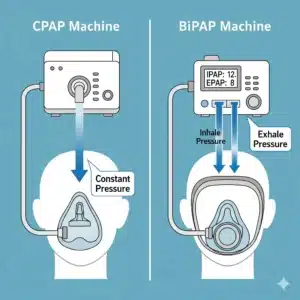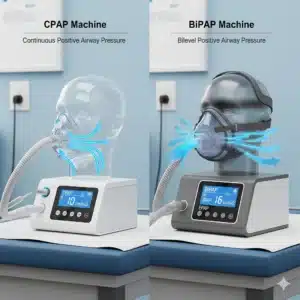CPAP vs BiPAP Machines When it comes to treating Obstructive Sleep Apnea (OSA), doctors often prescribe either a CPAP machine or a BiPAP machine. But many patients wonder: What’s the difference between CPAP and BiPAP? and Which one is better for me?
In this blog, we’ll compare CPAP vs BiPAP, explain how each machine works, highlight their pros and cons, and help you decide which treatment option might fit your needs best.

What is a CPAP Machine?
A CPAP (Continuous Positive Airway Pressure) machine delivers a constant, steady stream of air through a mask to keep your airway open during sleep.
Benefits of CPAP:
-
Gold standard treatment for OSA
-
Reduces snoring and apnea events
-
Improves oxygen levels and sleep quality
Limitations of CPAP:
-
Some patients find the constant pressure uncomfortable
-
May cause dryness or nasal irritation if not fitted properly
What is a BiPAP Machine?
A BiPAP (Bilevel Positive Airway Pressure) machine delivers two levels of air pressure:
-
Higher pressure when you inhale
-
Lower pressure when you exhale
Benefits of BiPAP:
-
Easier to exhale against lower pressure
-
Recommended for patients with more severe OSA, central sleep apnea, or COPD
-
Provides extra support for those who struggle with CPAP
Limitations of BiPAP:
-
More expensive than CPAP
-
Usually prescribed only when CPAP isn’t tolerated

CPAP vs BiPAP: Key Differences
| Feature | CPAP | BiPAP |
|---|---|---|
| Airflow | Constant pressure | Two levels (inhale & exhale) |
| Comfort | Can feel restrictive for some | More comfortable for exhaling |
| Common Use | Standard OSA treatment | Severe OSA, CSA, or CPAP intolerance |
| Cost | Less expensive | Higher cost |
| Prescription | First-line therapy | Alternative if CPAP not tolerated |
Which One Works Best for Sleep Apnea?
-
Mild to moderate OSA: CPAP is usually sufficient and highly effective.
-
Severe OSA or complex conditions (CSA, COPD): BiPAP may be the better choice.
-
Patient comfort: If exhaling against constant pressure is difficult, BiPAP offers relief.
FAQs (People Also Ask)
Q1. What is the main difference between CPAP and BiPAP?
CPAP delivers constant pressure, while BiPAP provides two pressure levels (inhale/exhale).
Q2. Is BiPAP better than CPAP?
Not always. CPAP is the standard treatment. BiPAP is usually prescribed if CPAP isn’t tolerated or for specific conditions.
Q3. Can BiPAP replace CPAP?
Yes, in cases where patients cannot tolerate CPAP, BiPAP may be used as an alternative.
Q4. Which machine is more comfortable?
Many patients find BiPAP more comfortable because it reduces exhalation effort.
Q5. Do insurance companies cover BiPAP and CPAP?
Most insurance plans cover CPAP. BiPAP may require additional medical justification.
